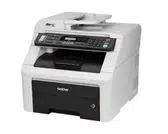Loading ...
Loading ...
Loading ...

238
Encryption methods E
Encryption is used to secure the data that is sent over the wireless network. The Brother machine
supports the following encryption methods:
WEP
By using WEP (Wired Equivalent Privacy), the data is transmitted and received with a secure
key.
TKIP
TKIP (Temporal Key Integrity Protocol) provides per-packet key mixing a message integrity
check and re-keying mechanism.
AES
AES (Advanced Encryption Standard) is Wi-Fi authorized strong encryption standard.
CKIP
The original Key Integrity Protocol for LEAP by Cisco Systems, Inc.
Network key E
There are some rules for each security method:
Open system/Shared key with WEP
This key is a 64-bit or 128-bit value that must be entered in an ASCII or hexadecimal format.
• 64 (40) bit ASCII:
Uses 5 text characters. e.g.“WSLAN” (this is case sensitive).
• 64 (40) bit hexadecimal:
Uses 10 digits of hexadecimal data. e.g.“71f2234aba”.
• 128 (104) bit ASCII:
Uses 13 text characters. e.g.“Wirelesscomms” (this is case sensitive).
• 128 (104) bit hexadecimal:
Uses 26 digits of hexadecimal data. e.g.“71f2234ab56cd709e5412aa2ba”.
WPA-PSK/WPA2-PSK and TKIP or AES
Uses a Pre-Shared Key (PSK) that is 8 or more characters in length, up to a maximum of
63 characters.
LEAP
Uses User ID and Password.
• User ID: less than 64 characters in length.
• Password: less than 32 characters in length.
EAP-FAST
Uses User ID and Password.
• User ID: less than 64 characters in length.
• Password: less than 32 characters in length.
Loading ...
Loading ...
Loading ...
